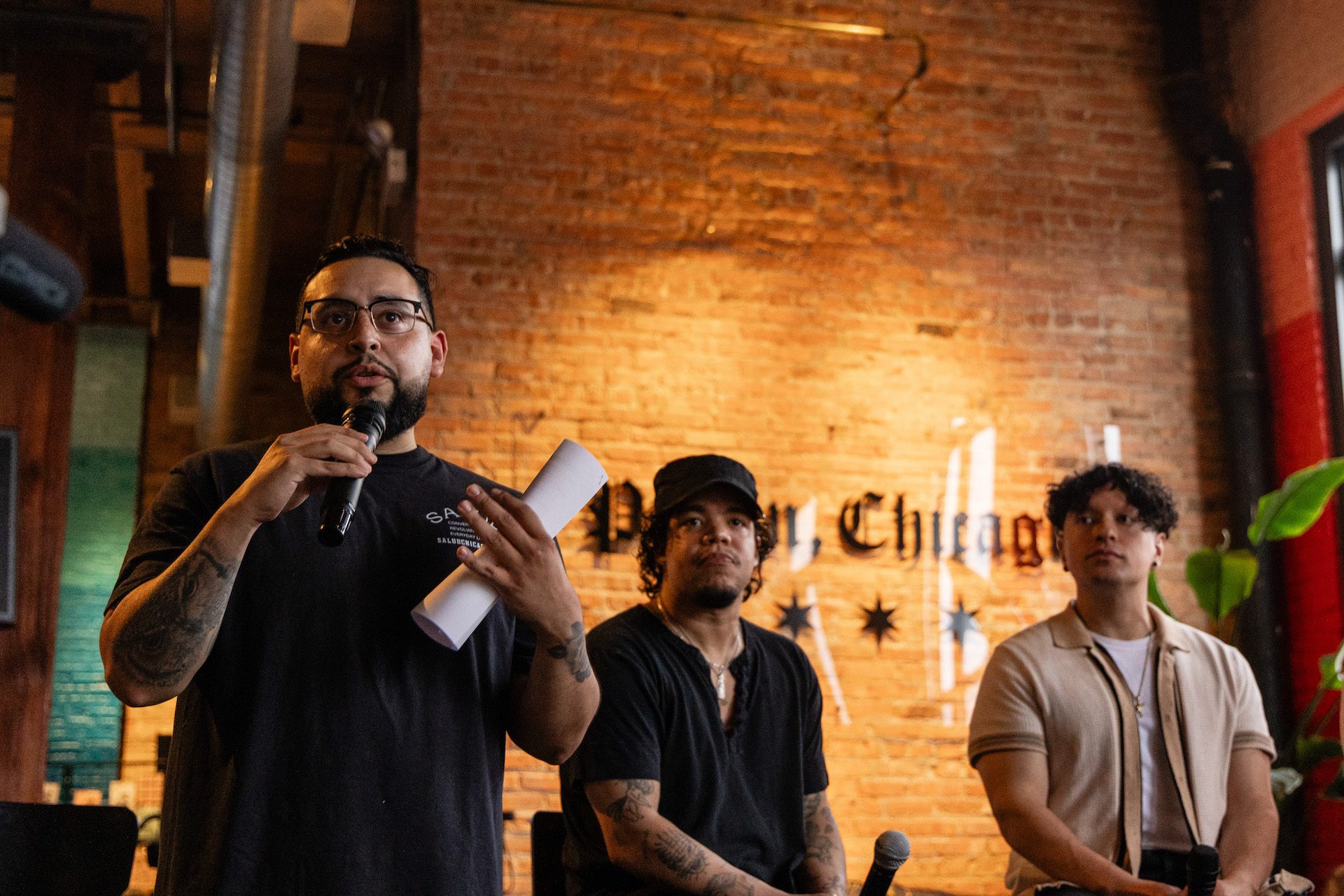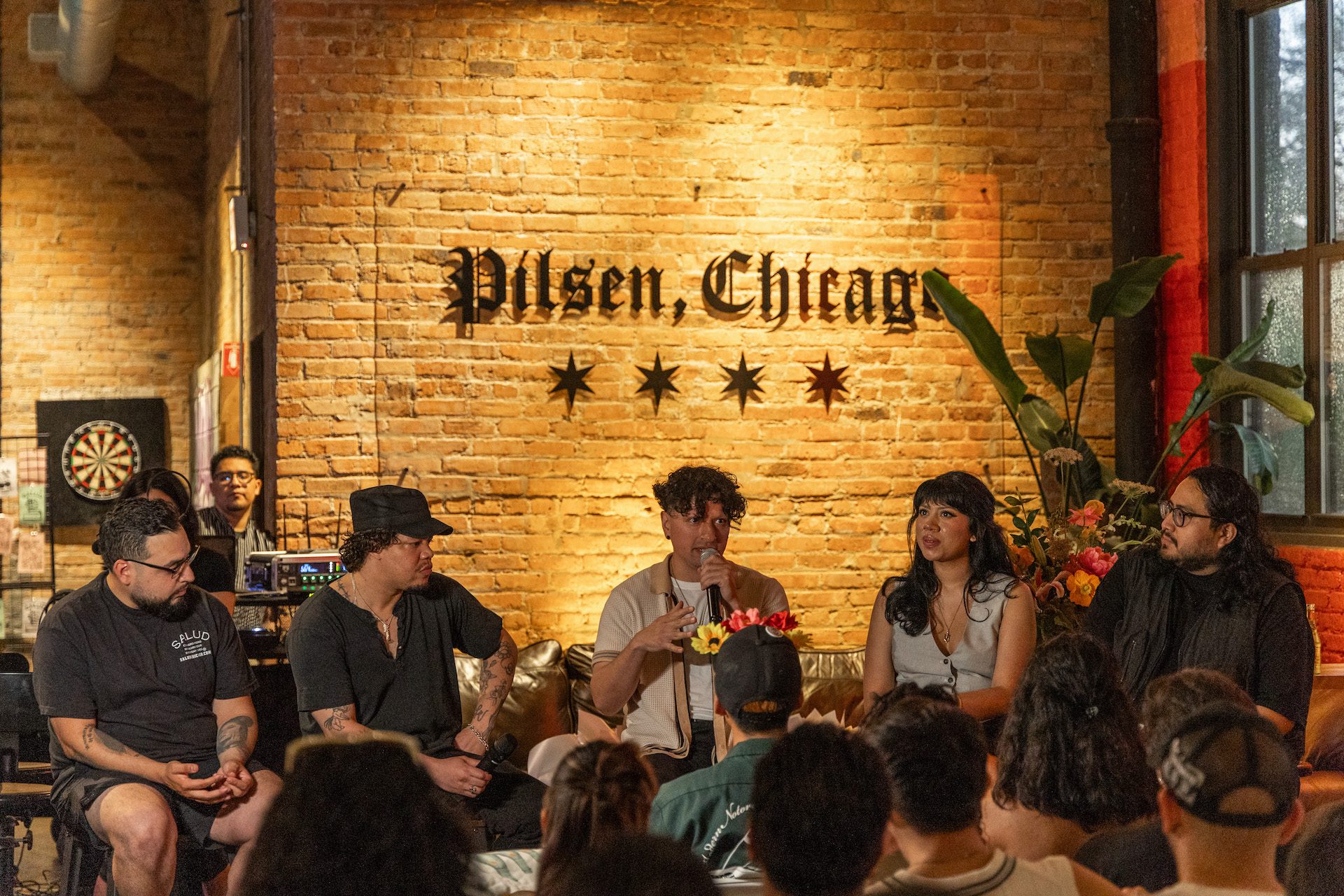 Oscar Gomez/Borderless Magazine
Oscar Gomez/Borderless MagazineDr. Ricardo Camacho, founder of Salud, spoke to Borderless about the importance of mental health support through community connection.
For over two years, Salud has hosted gatherings across Chicago to break down barriers around mental health in immigrant communities.
Dr. Ricardo Camacho, a bilingual psychologist and Loyola University Chicago professor, is behind these critical conversations. This initiative aims to foster community connection while destigmatizing conversations about mental health.
“[We] get reminded that our experiences are actually being faced by so many,” he said.“The person sitting next to you might be going through something similar and we wouldn’t know that unless we had the conversation in the first place.”
News that puts power under the spotlight and communities at the center.
Sign up for our free newsletter and get updates twice a week.
One in five Hispanics have a mental illness, though only 36% of Latinos receive mental health services compared to 52% of white people, according to the American Psychiatric Association.
Salud works with small businesses in neighborhoods like Pilsen and Little Village to create safe spaces for community members to gather and connect over conversations about mental health. Camacho doesn’t expect everyone to seek therapy, so he wants to show communities that there are alternative spaces and individuals offering therapeutic benefits.
Borderless Magazine spoke with Dr. Camacho for Mental Health Awareness Month about the importance of support and how Salud is working to destigmatize mental health within immigrant communities.
Embracing Identity
At every pivotal point in my life, my identity expanded as I grew older. I always understood that my identity was Latino and that I wanted to be a trailblazer in mental health work.
I am a product of two immigrant parents who came from Mexico and settled in the Chicago area when they were teenagers in the late 1980s.
I still get flashbacks about Pilsen when I was younger because that is where they migrated to and where I was born and raised for the first couple of years of my life.
I grew up in a culture where we have been told not to share what you’re going through because you may be viewed differently. This notion made me realize that it’s time we can’t ignore how we’re doing anymore.

When my parents were migrating, they faced many challenges and had many obstacles to overcome, but what was necessary was the network and tribe they developed in the community.
They instilled in me values of family and being authentic – that is being shown with Salud.
Whether your support or service is traditional therapeutic or requires community, it’s all about finding your tribe.
I am hoping that as we get to the center of these stories across our community, we will be able to overcome this negative stereotype about the communities that raised us.
Bridging the Mental Health Gap
I did not grow up in an environment where mental health conversations were common practice.
There is a gap in terms of how we even get the message out there, especially in marginalized and historically underrepresented communities, like Black and Hispanic communities in the Chicago area. With all the conflicts in the world, our mental wellness is being impacted and there’s a lack of services because of accessibility or just cultural stigma.
We rarely see opportunities and conversations about how we’re doing. We have been made to think that our struggles are expected, or our experiences are the standard, and that we are meant to survive and be resilient.
These disparities in mental health support exist across each identifying factor, but at the end of the day, we each have experiences. I am hoping that these experiences are something that unifies us more than creating more division and animosity.
Read More of Our Coverage
When we actually sit down and listen to the stories of the people sitting next to us, we will truly understand that there’s more connecting us than separating us, especially with our wellness.
In reality, we won’t be able to send every person who may need support to therapy. But we can connect them to therapeutic communities.
Whether it’s a running club, a book club, or finding neighborhood spaces, what’s important is identifying what works for you.
Healing is not a one-size-fits-all for everyone.
Building a Space for Healing
I think, with Salud, looking at a more systemic level is seeing how we can make the mental health conversation more approachable by not simply relying on a psychologist to navigate them.
I saw firsthand the systemic barriers, such as accessibility, language barriers, high fees, and proximity on the Southwest Side. That’s why I opened Salud. I wanted to serve communities that faced gaps but also shared similar experiences.

I earned my doctoral degree in 2021 when we were all isolated from each other and the world because of the COVID-19 pandemic. I didn’t feel the word “community” captured what we needed the most. Salud was created to create spaces representative to our cultures to come together to talk about how we’re doing.
To me, that’s real community.
Since operating for the last two years, we have seen several people receive support across Pilsen, Little Village, South Lawndale, Bridgeport, Lincoln Park, Cicero and more. That’s a big deal for communities that haven’t traditionally sought out mental health support.
We can celebrate ourselves by letting each other know that talking about mental health is good. It doesn’t have to be in quiet areas, because being Latino, sometimes our gatherings can be loud and exciting. That’s what culture is.
I think our joy is borderless. Our capacity to heal does not have a limit.
So with Salud, if we’re going to heal one another, we can do it in ways that work for us.
That’s how we hope to heal the culture.
I hope we’re bridging people to their communities.
Clarification 05/30/25: This story has been updated to clarify data from the American Psychiatric Association regarding the number of Latinos receiving mental health services.
This story was produced using Borderless Magazine’s collaborative as-told-to method. To learn how we make stories like these, check out our as-told-to visual explainer.
Tara Mobasher is a Northwestern Medill reporting fellow at Borderless Magazine. Email Tara at [email protected].

